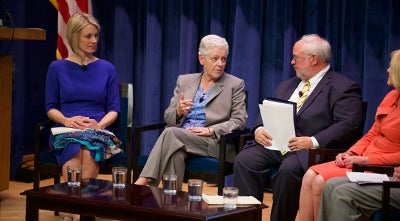Title: EPA’s Gina McCarthy Participates in Georgetown Encyclical Panel
EPA Administrator Gina McCarthy will participate in a conversation on “Pope Francis’ Encyclical on the Environment: A Dialogue on its Moral and Policy Challenges” on July 1 at Georgetown.
EPA Administrator Gina McCarthy of the U.S. Environmental Protection Agency, compared the mission of her agency with Pope Francis’ encyclical on the environment last night during a panel discussion at Georgetown.
The pope’s encyclical is a lengthy document that callsfor environmental justice and sustainable development practices.
“We are both dealing with a moral obligation to protect our children and our children’s children,” said McCarthy, an Irish Catholic from Massachusetts who met with senior officials at the Vatican, including Cardinal Peter Turkson, earlier this year.
McCarthy was part of a panel addressing the connections between environmental degradation and the perpetuation of poverty.
“The pope has internalized those connections the same way I have,” she said.
Georgetown Panel

EPA Administrator Gina McCarthy, center, talks about the pope’s most recent encyclical on the environment with Christiana Peppard, professor of moral theology at Fordham University, seated left, and moderator John Carr, director of Georgetown’s Initiative on Catholic Social Thought and Public Life, at McCarthy’s right.
McCarthy was joined by leaders in academia, journalism and business for the July 1 conversation on “Pope Francis’ Encyclical on the Environment: A Dialogue on its Moral and Policy Challenges.”
Georgetown’s Initiative on Catholic Social Thought and Public Life hosted the conversation.
Moderated by the initiative’s director, John Carr, the panel included Anne Thompson, chief environmental affairs and Vatican correspondent for NBC News;Christiana Peppard, professor of moral theology at Fordham University; and RalphIzzo, chair, president and CEO ofPublic Service Enterprise Group Inc.
Environmental Justice
In his encyclical, Francis decries the disproportionate effect of climate change on the poor and its devastating impact on their resources.
“When people challenge the EPA, they say that the environment is contrary to the economy,” McCarthy said. “But to me, environmental degradation is what’s keeping the world back – it’s what is keeping the poor poor.”
The first non-European pope since 741, Pope Francis, who was born in Buenos Aires, is also the first Catholic Church leader from the Southern Hemisphere, which panelists said gives him a different world view.
“Pope Francis looks at the issue of the environment, as he does all issues, from the bottom up,” Carr said. “The environment looks different from the slums of Argentina.”
Thompson, who has traveled with the pope since he was elected in 2013, said “reaching out to those who suffer, to those who are marginalized, is at the heart of his papacy.”
“What he’s saying to the developed world is – you have reaped the benefits of this world … at the price of the poor,” she added. “Now it’s time to pay that ecological debt.”
A Call to Action
McCarthy called the encyclical a “game-changer.”
“The pope gave us the ability to reach people and get the kind of momentum we need not just in the US, but internationally,” she said.
McCarthy also said the EPA will capitalize on the momentum catalyzed by the encyclical.
Other panelists issued calls for political leaders to embrace the pope’s message of protecting the environment and the poor by designing new jobs in energy efficientfields or enabling universal access to renewable sources of energy.
“The encyclical is a call to moral leadership,” Peppard said. “The world is ready for a voice to call us to conversation.”